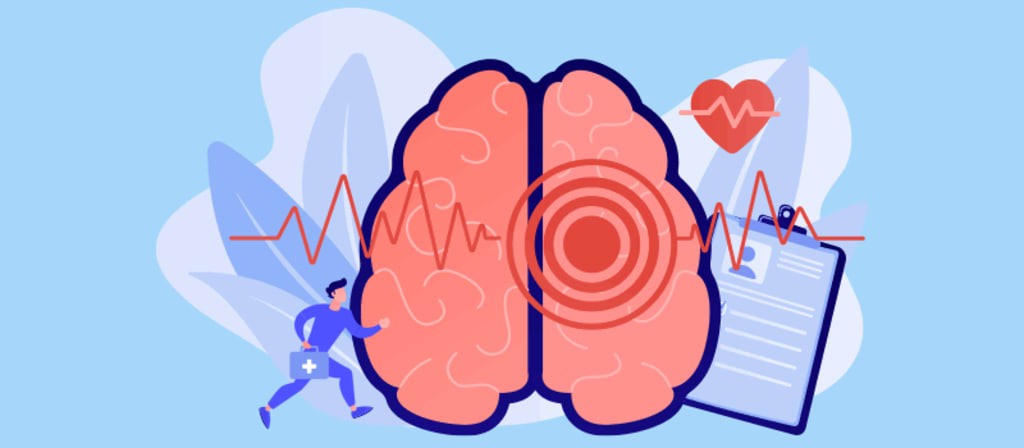Stress and stroke: what happens?
Stress and stroke

The stress is a condition of physical and emotional painful feelings, which is caused by unwanted happenings of the life. The stress can be due to any reason. It can be due to an incident, a though, fear of something or anything that makes you feel disappointed, afraid, hopeless and angry, makes you stress. Due to stress our body releases different types of chemical messengers called hormones. A hormone is a chemical substance that mixes with blood and travel with the blood to reach its targeted areas and perform its function.
Basically there are two types of stress; short term stress and long term stress.
1. short term stress
Short term stress is a type stress that is caused by a sudden dangerous situation or something happens opposite of the expections. Short term stress is also called fight and flight response. Short term stress includes fear, anger, nervousness etc.
In this situation our body produces two types of hormones called adrenaline or epinephrine and non adrenaline or non epinephrine. These hormones are released by medulla which is the inner part of the adrenal gland. These hormones are released by the signal of autonomic nervous system. These two hormones mix with blood and results different changes in the body. For example,
- Increased rate of heart beat
- High breathing rate
- High blood pressure
- High blood glucose level
- fast metabolism
These all changes in the body helps us to run, fight or face the dangerous situation.
Long term stress
Long term stress is the type of stress which is caused by an incident, a though and sorrows. This type of stress is more harmful to the body. Because in this situation our body produces a high amount of cortisol hormone. This hormone is released by the cortex region of adrenal gland. Normally, cortisol hormone helps in tissue repair and increases thinking ability of the brain but continuous secretion of cortisol hormone is harmful to the body. The high amount of cortisol hormone increase the risk of various diseases in the in body; for example,
- Cortisol hormone increases the level of glucose in the blood which results in diabetes malitus.
- Cortisol hormone converts lipids and proteins into glucose. In this case the mass of the body muscles decrease and the body become weak.
- high cortisol level in blood also weaken the immune system, because when the cortisol hormone is released continuously, the immune system become busy in maintaining the blood glucose level, which results in weaking of the immune system.
In short, the stress is the root of all kinds of diseases, because it distrust the normal functioning of the body. So avoid stress and always be happy.
About 2400 years ago, there lived a physician named Hippocrates. He was working on a disease which was called "apoplexy" at that time. He was the most intelligent physician who got the title of the "father of medicine". wanted to prove that not only the spirits are responsible for diseases, but there exist micrograms or germs in the world which cause diseases too, and a proper treatment can be discovered for them. His thinking brought a big revolution in field of science and from all, one of them was the discovery of stroke.
Before the discovery of the stroke, people thought that when a body comes under torture, it gets paralyzed and this state of body was called apoplexy. But Hippocrates proved that body doesn't get paralyzed by apoplexy, but there is a disease called stroke due to which body get paralyzed.
What is a stroke?
The stroke is a condition in which some important tissues of brain don't get proper supply of the blood, due to which death of the brain's tissues occur.
Actually, in case of stroke, the supply of blood get disturbed due to the formation of a clot inside the blood vessel. It stops the supply of blood due to which the brain tissues don't get proper amount of blood.
Symptoms
For some common symptoms of brain stroke, there is a key word called FAST which stands for, face drops, arms weakness, speech difficulty and time is critical. From all these some other symptoms are headache, trouble in walking and paralysis.
Causes
There are two main causes of brain stroke, one is due to the blocked artery and the second is the rapturing of the blood vessel. When the stroke occurs due to the blocked artery, this condition is called ischemic stroke. In this stroke, a clot occurs inside the artery that supplies blood to the brain's tissues. Mostly, the clot is formed due to the deposition of fats and debris. Due to this clot, the blood vessel get narrow or sometimes get blocked completely due to which blood can't reach to the brain's tissues. If we see the risk factors that developed the stroke are;
1. Obesity
2. Physical inactivity
3. Heavy drinking
4. High blood pressure
5. High cholesterol
6. Cigarette smoking
7. COVID-19 infection
8. Cardiovascular diseases
The chances of stroke are higher in aged people almost above 50. Sometimes the stroke produces some permanent changes in the body. For example, paralysis, loss of memory, pain and difficulty in swallowing.
Treatment
For the treatment of stroke some medicine are prescribed, but in severe cases, a surgery is performed which is called craniectomy. In craniectomy, a portion of skull is removed and then the damaged blood vessel is replaced, or the clot is removed. After that, the skull piece is fixed in its position. So, like this, the patient get recovered.
About the Creator
Parveen Baloch
MPhil/Zoology, Freelance writer
Enjoyed the story? Support the Creator.
Subscribe for free to receive all their stories in your feed. You could also pledge your support or give them a one-off tip, letting them know you appreciate their work.





Comments
There are no comments for this story
Be the first to respond and start the conversation.